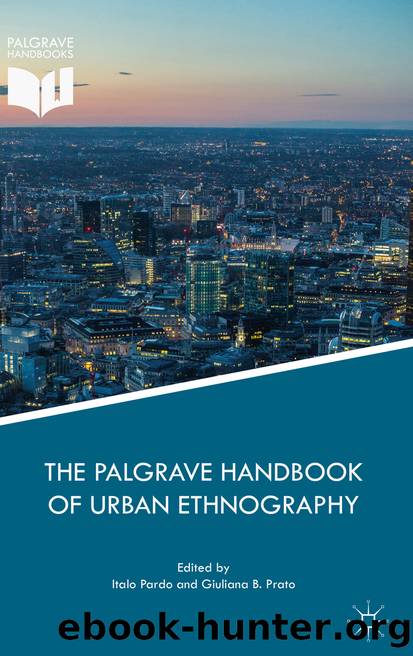The Palgrave Handbook of Urban Ethnography by Italo Pardo & Giuliana B. Prato

Author:Italo Pardo & Giuliana B. Prato
Language: eng
Format: epub
Publisher: Springer International Publishing, Cham
Dolores Koenig1
(1)Department of Anthropology, The American University, Washington, DC, USA
Dolores Koenig
West African cities face a daunting set of challenges in becoming effective and humane urban environments. These include climate change, political instability, regional conflict, poverty, lack of access to basic services, increasing income inequality and threats to food security (UN-Habitat 2014). To meet existing and future challenges, cities need to invest in new infrastructure at a ‘staggering’ scale (UN-Habitat 2014, 119). Key to making effective use of potential investment are the region’s urbanists, who diagnose and plan for growth and change in the region’s metropolitan areas.
This chapter, based on interviews conducted in 2008 and 2009, focuses on urban specialists in three French-speaking West African cities: Dakar, Bamako and Ouagadougou. I call these specialists urbanists, adopted from the French term urbaniste. The term includes not only city planners as such but also people with training in planning and architecture, often taught in the same schools in the French system. The group also includes scholars who deal in some way with urban growth and development, including geographers, economists and demographers. Many work in national or municipal agencies, but others work within the private sector, including non-governmental organizations (NGOs) and small for-profit firms.
How do these West African urbanists understand the challenges they face and what they, as urban specialists and experts, can do about them? Here I focus on the multiple positions occupied by urbanists in these cities. Defined as experts in urban systems, they are also realistic members of a bureaucratic class and citizens who are themselves residents of the cities they plan, run and criticize. This chapter proposes that each of their multiple positions presupposes certain approaches to understanding and action. These may be in conflict with one another, which can lead to contradictions in the actions of individual urbanists. While the contradictions do not themselves explain why city planning is often perceived as ineffective, they reflect the political-economic stresses in cities that affect those who plan them.
I first discuss Bamako, Ouagadougou and Dakar, the three cities that are the focus of this chapter, and some of the challenges they face. I shall then address some of the issues surrounding the role of urbanists. Finally, I examine the different roles of urbanists: as experts and rational planners; as political and economic realists; and as co-citizens and residents of their cities. The conclusion will discuss what we can learn about urban development by studying the role contradictions faced by urbanists.
Download
This site does not store any files on its server. We only index and link to content provided by other sites. Please contact the content providers to delete copyright contents if any and email us, we'll remove relevant links or contents immediately.
Cecilia; Or, Memoirs of an Heiress — Volume 1 by Fanny Burney(31326)
Cecilia; Or, Memoirs of an Heiress — Volume 3 by Fanny Burney(30929)
Cecilia; Or, Memoirs of an Heiress — Volume 2 by Fanny Burney(30886)
The Great Music City by Andrea Baker(21196)
We're Going to Need More Wine by Gabrielle Union(18067)
Bombshells: Glamour Girls of a Lifetime by Sullivan Steve(13102)
Pimp by Iceberg Slim(12924)
All the Missing Girls by Megan Miranda(12741)
Fifty Shades Freed by E L James(12445)
Norse Mythology by Gaiman Neil(11876)
Talking to Strangers by Malcolm Gladwell(11865)
Crazy Rich Asians by Kevin Kwan(8343)
Mindhunter: Inside the FBI's Elite Serial Crime Unit by John E. Douglas & Mark Olshaker(7830)
The Lost Art of Listening by Michael P. Nichols(6465)
Enlightenment Now: The Case for Reason, Science, Humanism, and Progress by Steven Pinker(6404)
Bad Blood by John Carreyrou(5763)
The Four Agreements by Don Miguel Ruiz(5503)
Weapons of Math Destruction by Cathy O'Neil(5032)
We Need to Talk by Celeste Headlee(4863)
